France Summons Iranian Diplomat Over Protests Crackdown
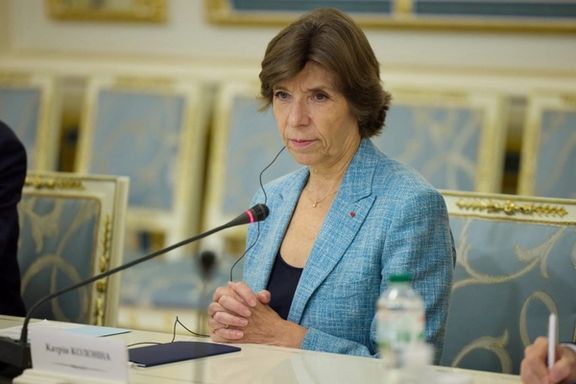
France's foreign minister says Iran’s charge d’affaires has been summoned over the supply of weapons to Russia used in Ukraine and crackdown on protesters.

France's foreign minister says Iran’s charge d’affaires has been summoned over the supply of weapons to Russia used in Ukraine and crackdown on protesters.
Catherine Colonna told Reuters that the Iranian diplomat was also questioned over the treatment of seven French nationals who are currently in custody in Iran.
France’s foreign ministry on Monday also condemned the public execution of an Iranian who was sentenced to death following his participation in the protests currently under way in Iran.
The Islamic Republic hanged a second protester, Majidreza Rahnavard in less than a week in public on Monday after charging him with killing two members of security forces.
In a statement the Ministry of Europe and Foreign Affairs of France stated, “this execution, the second in less than a week, comes in addition to the many other serious, unacceptable violations of fundamental rights and freedoms committed by the Iranian authorities.”
The statement also added that demonstrators must not be executed in response to the current protests in Iran, stressing France calls on Iranian authorities to halt these executions and to listen to the legitimate aspirations of the Iranian people.
Meanwhile, Foreign Secretary of the United Kingdom said Tuesday that Iran and Russia's sordid deals threaten global security.
James Cleverly said in a tweet that “We are holding their desperate alliance to account.”
He also noted that London has just sanctioned high-level Russian and Iranian figures in response to the “abhorrent strikes against civilian targets.”
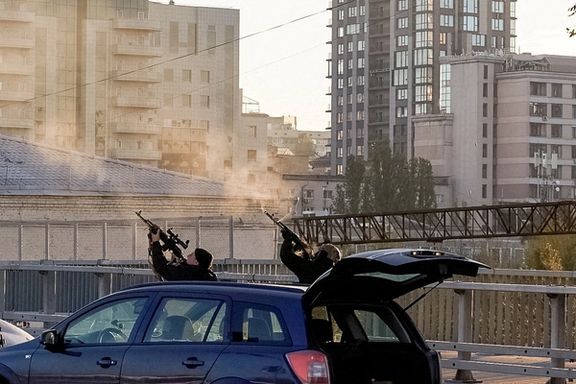
A US military official says Russia has used most of its ammunition in its war against Ukraine and it has now turned to decades-old ammo.
Speaking on condition of anonymity, the official said Monday that Moscow burns through its stockpiles to carry out its nearly 10-month-old invasion of Ukraine, but the old ammunition have a high failure rate.
“They have drawn from (Russia's) aging ammunition stockpile, which does indicate that they are willing to use that older ammunition, some of which was originally produced more than 40 years ago,” added the official.
The United States accuses Russia of turning to Iran and North Korea for more firepower as it exhausts its regular supplies of ammunition.
According to the senior military official, Russia would burn through its fully serviceable stocks of ammunition by early 2023 if it did not resort to foreign suppliers and older stocks.
Iran last month acknowledged it had supplied Moscow with drones, but said they were sent before the war in Ukraine.
The United States in mid-November imposed sanctions on companies and people being involved in the production or transfer of Iranian drones to Russia.
The EU foreign ministers on Monday hit out at Iran for supplying drones to Russia, saying the weapons are being used indiscriminately by Russia against Ukrainians.
Last month, the EU imposed sanctions on the chief of Iran’s Revolutionary Guard, the IRGC’s Aerospace Force and a company making drones.
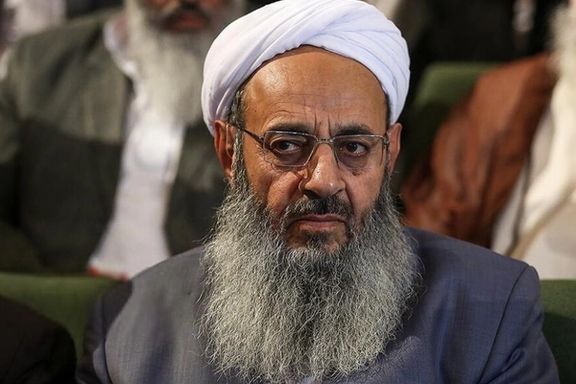
Leading Iranian Sunni cleric Mowlavi Abdolhamid has once again warned about the consequences of executions and suppression of protesters in Iran.
In a tweet on Monday, Abdolhamid, the religious leader of Iran’s largely Sunni Baluch population, asked the authorities of the Islamic Republic to listen to the voice of the protesters.
His comments came after the Iranian regime hanged a second protester, Majidreza Rahnavard in less than a week in public on Monday after charging him with killing two members of security forces.
“Arbitrary executions and repression have no result other than God’s displeasure, public hatred, and igniting the nation’s anger,” reads his tweet.
He further asked the government to “see the facts and hear the voice of the people.”
During his trial, Majidreza Rahnavard was denied the right to choose a lawyer, and his execution was carried out only 23 days after his arrest, which has raised many questions about the trial process and judicial justice.
Abdolhamid had previously said in reaction to the execution of Mohsen Shekari, who was the first protester hanged by the regime December 8, “it is not correct from the viewpoint of the Quran and Sharia to execute a person who did not kill anyone and only blocked the road and used a knife.”
Mohsen Shekari, the 23-year-old protester was only accused by the judiciary of blocking a street and injuring a Basij militia.
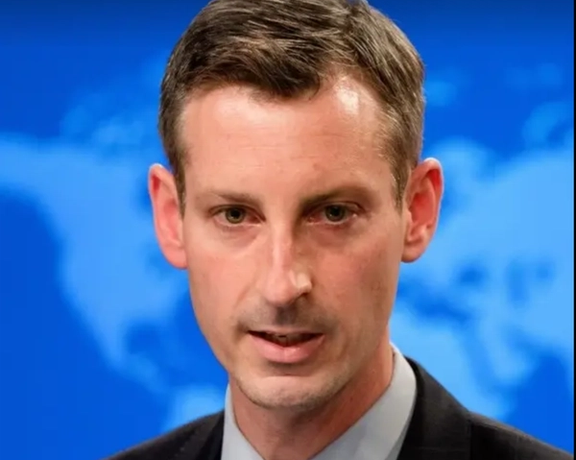
The United States has slammed Iran for hanging a protester in public, saying the regime’s use of harsh sentencing and public execution is meant to intimidate the people.
State Department spokesperson Ned Price told a briefing on Monday that “we denounce this draconian treatment in the strongest terms. These harsh sentences and now the first public execution...are meant to intimidate Iran's people. They're meant to suppress dissent. And they simply just underscore how much Iran’s leadership fears its own people.”
The Islamic Republic hanged a second protester, Majidreza Rahnavard in less than a week in public on Monday after charging him with killing two members of security forces.
Majidreza Rahnavard is the Islamic Republic’s latest victim, said Ned Price, adding that he was swiftly executed after what can only be described as a sham trial.
“We understand that he was also executed publicly; he was hanged in public. The regime has rounded up and detained thousands of people for their involvement in these protests. Many of them now face harsh sentences, including the death penalty and sham trials that lack any due process,” Price went on to say.
He reiterated that the US used its human rights authorities to hold accountable those who are responsible for this brutal crackdown.
Washington has imposed some sanctions for Tehran’s human rights violations since September, but still says it is ready for diplomacy over Iran’s nuclear program.
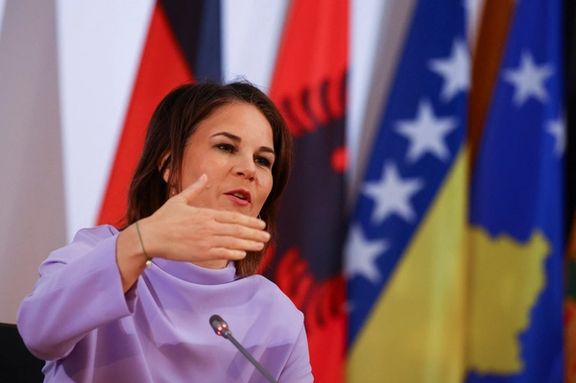
The EU Monday designated 20 people and Iran’s state media over reported human rights abuses, along with eight people or entities over sending drones to Russia.
European Union foreign policy chief Josep Borrell called the package “very tough,” and an EU foreign minister’s statement criticized a “brutal and disproportionate use of force” against protests. German Foreign Minister Annalena Baerbock said the sanctions would target “in particular those who are responsible for the executions, the violence against innocent people...especially the Revolutionary Guards.”
Iran Monday executed the second person over the unrest, which has seen the deaths of 488 protestors and 62 members of the police or security forces, according to Norway-based HRANA.
Among those sanctioned Monday under the human-rights rubric were Major-General Abdolrahim Mousavi, commander-in-chief of Iran’s army. A range of designated regional commanders of the Revolutionary Guards (IRGC) were largely concentrated in the mainly Kurdish northwest, which along with the Baluchi south east has seen the most violence. IRGC commanders in the provinces of Tehran, Mazandaran, Alborz, Markazi, were also listed along with Sistan-Baluchistan’s provincial police chief.
As well as designating state broadcaster IRIB, the EU listed Peyman Jebelli, its director, IRIB’s deputy director, its head of foreign services, and Ali Rezvani, who is a "journalist-interrogator" of political prisoners. Ahmad Khatami, Tehran prayer leader, was added, the EU statement said, as the cleric “with a large audience…leverages his position to verbally attack and incite violence against protesters.” All designated individuals risk the loss of assets in the EU.
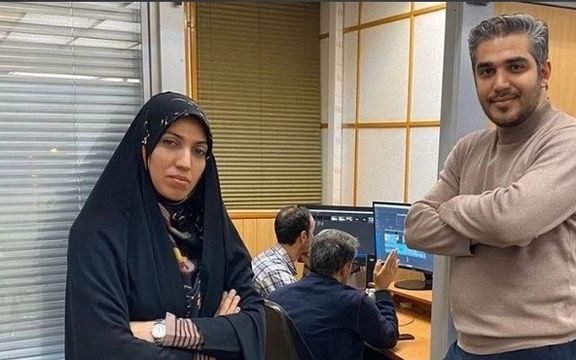
The EU in November sanctioned Hossein Salami, the IRGC commander, and Amir Ali Hajizadeh, commander of the IRGC aerospace force, as well as the aerospace force and a military company, over sending military drones to Russia, but the EU has not sanctioned the IRGC as a whole. The United States in 2019 listed the Guards as a ‘foreign terrorist organization’ as part of its ‘maximum pressure’ sanctions, the only occasion it has designated part of a state’s armed forces.
Under Monday’s new sanctions, the EU designated four additional individuals, including the head of Iran’s air force, over the drones, as well four military contractors or design companies.
The EU foreign ministers’ statement said the drones were “being used indiscriminately by Russia against Ukrainian civilian population and infrastructure causing horrendous destruction and human suffering.” The ministers agreed another €2 billion ($2.1 million) in military aid for Ukraine, adding to the €2 billion already sent, while a further package of sanctions on Russia, the EU’s ninth, is reportedly being held up by Hungary. The US has sent Ukraine $20 billion in weapons, and the UK $2.3 billion.
‘Turning Iran into a second North Korea’
The new EU sanctions on Iran over human rights abuses brought to 166 individuals and 12 entities the total it has sanctioned on such grounds. Those designated in the last batch on November 14 included provincial police commanders in Kurdish and Baluchi regions, the army’s ground-forces commander, the minister of the interior, and members of the Tehran ‘morality police.’
With the rial falling further as US ‘maximum pressure’ continues and unrest undermines business confidence, Hannah Neumann, a German Green Party member of the European Parliament, told Iran International in an interview she saw no justification for European states breaking off diplomatic links or expelling Tehran from United Nations bodies.
“I don’t think it helps protestors in Iran, if we turn the country into a second North Korea by closing all our embassies,” she said. “This is my personal opinion. Others have a different one. I respect that. Isn’t that what we all fight for, democracy and freedom of expression?”
Neumann claimed that “what is happening in Iran is the world’s first feminist revolution.” She said it would give hope to women in Egypt, Afghanistan and elsewhere in the Middle East as well as around the globe.
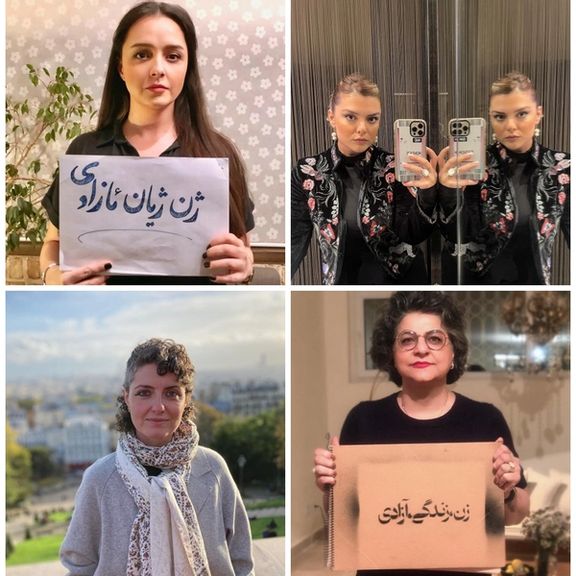
A group of Iranian artists have formed an association to support the rights of political prisoners, and artists who were injured or imprisoned during the ongoing protests.
The association called “Iranian Film and Theater Artists Abroad” is formed by 17 theater and cinema writers, filmmakers, and actors, and so far over 100 other artists inside and outside the country have joined it.
In a statement on Monday, the association said, “the release of political prisoners and artists, and putting international pressure on the Islamic Republic to stop issuing death sentences are among the most important demands of the association.”
As part of their statement, the signatories condemned the crackdown on protests, specifically the suppression of theater and film artists, saying, “The time has come to prevent more crimes by the Islamic Republic with launching massive protests and taking steps together with the people of Iran to end the existence of this repressive system.”
The statement has been endorsed by reputable international artists such as English actor Benedict Cumberbatch, English filmmakers Ken Loach, Mike Leigh, Claire Simon, Mike Figgis, and Clio Barnard, Austrian theater director Stephan Bruckmeier, and American filmmakers Jeff Preiss and Deborah Hoffmann.
Since the start of nationwide protests in mid-September regime forces have killed nearly 500 protesters including 63 children and 29 women.
Many artists in various fields have been threatened due to their solidarity with people's protest movement and dozens arrested.
In the meantime, unconfirmed reports also say that Hossein Mohammadi, a 26-year-old theater actor has been sentenced to death.